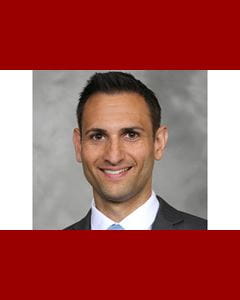Al Hassanein, MD, an Assistant Professor of Surgery with Indiana University School of Medicine, Department of Surgery, recently earned the Plastic Surgery Foundation (PSF) and Plastic Surgery Research Council (PSRC) Combined Pilot Research Grant. The PSF/ PSRC, fund the Pilot Research Grant to foster the development of surgeon scientists in the field of Plastic Surgery. They also increase the amount of research dollars funding pilot research studies, allowing investigators to apply to larger funding agencies.
Dr. Hassanein’s pilot grant allows him further his research in Lymphedema. Lymphedema is a condition caused by an injury to the lymphatic system, part of the immune and circulatory systems. Lymphedema is most commonly caused by lymph node removal/ damage due to cancer treatment. The main symptom is swelling in an arm or leg, often accompanied by pain or discomfort.
We sat down with Hassanein to discuss how this pilot grant will help advance his research in Lymphedema.
What sparked your interest in Lymphedema research?
I became interested in Lymphedema, because clinically, as a microsurgeon in plastic surgery, I frequently perform reconstruction in patients with breast cancer. A lot of these patients end up developing Lymphedema. I treat a large portion of these patients in Indiana. I witness how it's affecting their life. We have a great treatment or cure for Lymphedema. That's been my motivation in trying to find ways to help these patients. The current treatments I offer including microsurgical lymph node transfer and lymphovenous bypass may help but are not a cure.
How can this research help medical students, residents, or fellows?
It can help medical students by allowing them to be part of programs like IMPRS through the IU School of Medicine, which allows medical students finishing their first year of medical school to do summer research. We currently have two medical students in our lab. This also allows us an opportunity to mentor these medical students and give them a taste of academic surgery. Our plastic surgery residents are involved in various research projects involving lymphedema and breast reconstruction.
How will the funding from this pilot grant help your current efforts in Lymphedema?
This pilot grants vital to help leverage and launch research to ultimately receive a grant from the National Institute of Health. That's the goal, and that’s where I think we could make significant progress towards results that move us to finding better treatments that translate to improved patient care.
What do you think earning this award shows about the interest the plastic surgery community has about Lymphedema?
It shows that the plastic surgery community prioritizes these patients and understands the suffering of those with Lymphedema. It shows that these foundations want to fund research to help move Lymphedema progress forward. They understand it's a clinical problem without a good solution right now. It draws community awareness. The ultimate goal is to help patients with Lymphedema. If our ideas are seen through, we are hopeful that we will find an innovative, non-surgical approach to improve Lymphedema.
